英国议会制辩论常用语精华总结(BP debate)
- 格式:doc
- 大小:21.50 KB
- 文档页数:5
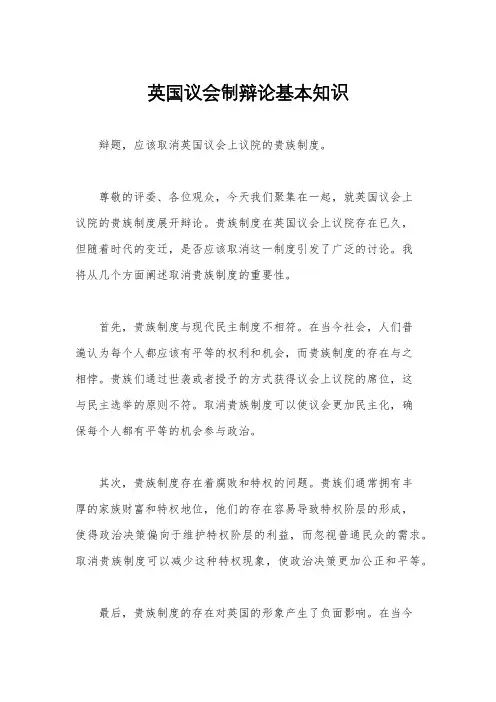
英国议会制辩论基本知识
辩题,应该取消英国议会上议院的贵族制度。
尊敬的评委、各位观众,今天我们聚集在一起,就英国议会上
议院的贵族制度展开辩论。
贵族制度在英国议会上议院存在已久,
但随着时代的变迁,是否应该取消这一制度引发了广泛的讨论。
我
将从几个方面阐述取消贵族制度的重要性。
首先,贵族制度与现代民主制度不相符。
在当今社会,人们普
遍认为每个人都应该有平等的权利和机会,而贵族制度的存在与之
相悖。
贵族们通过世袭或者授予的方式获得议会上议院的席位,这
与民主选举的原则不符。
取消贵族制度可以使议会更加民主化,确
保每个人都有平等的机会参与政治。
其次,贵族制度存在着腐败和特权的问题。
贵族们通常拥有丰
厚的家族财富和特权地位,他们的存在容易导致特权阶层的形成,
使得政治决策偏向于维护特权阶层的利益,而忽视普通民众的需求。
取消贵族制度可以减少这种特权现象,使政治决策更加公正和平等。
最后,贵族制度的存在对英国的形象产生了负面影响。
在当今
国际社会,越来越多的国家选择取消贵族制度,认为这是民主和平等的体现。
而英国作为一个现代化的国家,应该顺应时代的潮流,取消这一制度,以展现其民主和平等的价值观。
综上所述,取消英国议会上议院的贵族制度是符合时代潮流、有利于民主化和公正性、并有助于提升英国国际形象的重要举措。
因此,我强烈支持取消贵族制度,希望各位评委和观众也能够支持这一观点。
谢谢!。
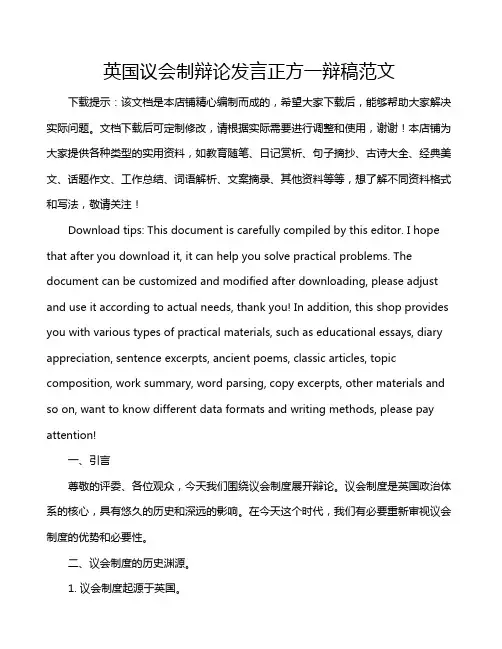
英国议会制辩论发言正方一辩稿范文下载提示:该文档是本店铺精心编制而成的,希望大家下载后,能够帮助大家解决实际问题。
文档下载后可定制修改,请根据实际需要进行调整和使用,谢谢!本店铺为大家提供各种类型的实用资料,如教育随笔、日记赏析、句子摘抄、古诗大全、经典美文、话题作文、工作总结、词语解析、文案摘录、其他资料等等,想了解不同资料格式和写法,敬请关注!Download tips: This document is carefully compiled by this editor. I hope that after you download it, it can help you solve practical problems. The document can be customized and modified after downloading, please adjust and use it according to actual needs, thank you! In addition, this shop provides you with various types of practical materials, such as educational essays, diary appreciation, sentence excerpts, ancient poems, classic articles, topic composition, work summary, word parsing, copy excerpts, other materials and so on, want to know different data formats and writing methods, please pay attention!一、引言尊敬的评委、各位观众,今天我们围绕议会制度展开辩论。
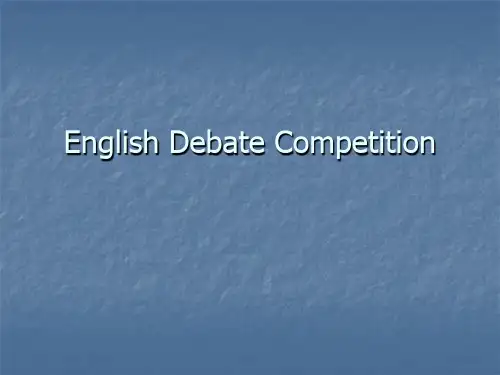
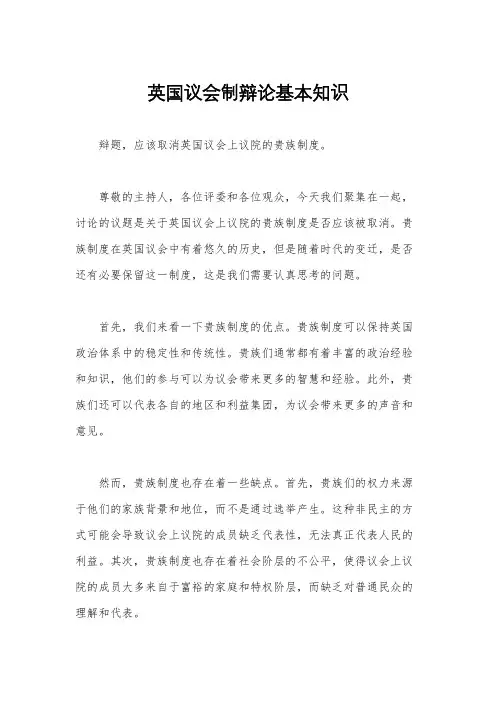
英国议会制辩论基本知识
辩题,应该取消英国议会上议院的贵族制度。
尊敬的主持人,各位评委和各位观众,今天我们聚集在一起,讨论的议题是关于英国议会上议院的贵族制度是否应该被取消。
贵族制度在英国议会中有着悠久的历史,但是随着时代的变迁,是否还有必要保留这一制度,这是我们需要认真思考的问题。
首先,我们来看一下贵族制度的优点。
贵族制度可以保持英国政治体系中的稳定性和传统性。
贵族们通常都有着丰富的政治经验和知识,他们的参与可以为议会带来更多的智慧和经验。
此外,贵族们还可以代表各自的地区和利益集团,为议会带来更多的声音和意见。
然而,贵族制度也存在着一些缺点。
首先,贵族们的权力来源于他们的家族背景和地位,而不是通过选举产生。
这种非民主的方式可能会导致议会上议院的成员缺乏代表性,无法真正代表人民的利益。
其次,贵族制度也存在着社会阶层的不公平,使得议会上议院的成员大多来自于富裕的家庭和特权阶层,而缺乏对普通民众的理解和代表。
因此,我们认为应该取消英国议会上议院的贵族制度。
取消贵族制度可以使得议会更加民主和代表性,让更多不同背景和阶层的人有机会参与政治。
同时,这也可以减少特权阶层对政治的影响,让议会更加公正和公平。
当然,取消贵族制度也需要一系列的改革和调整,以确保议会上议院的运作和效率不受影响。
在结束之前,我希望大家都能认真思考这个问题,为英国议会的未来和发展出谋划策。
谢谢。
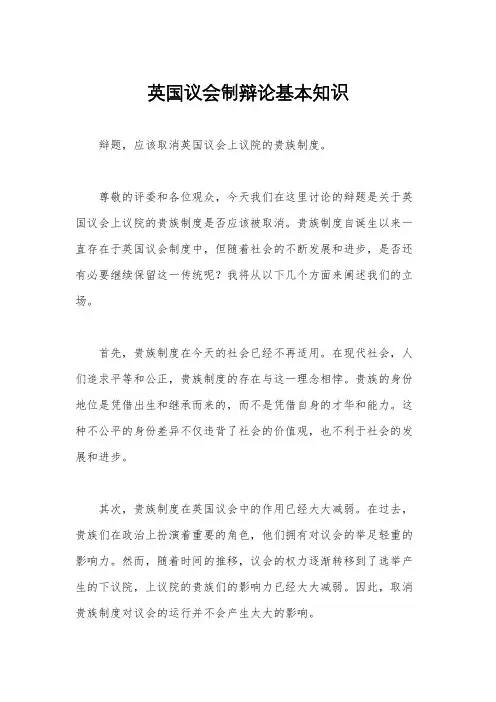
英国议会制辩论基本知识
辩题,应该取消英国议会上议院的贵族制度。
尊敬的评委和各位观众,今天我们在这里讨论的辩题是关于英国议会上议院的贵族制度是否应该被取消。
贵族制度自诞生以来一直存在于英国议会制度中,但随着社会的不断发展和进步,是否还有必要继续保留这一传统呢?我将从以下几个方面来阐述我们的立场。
首先,贵族制度在今天的社会已经不再适用。
在现代社会,人们追求平等和公正,贵族制度的存在与这一理念相悖。
贵族的身份地位是凭借出生和继承而来的,而不是凭借自身的才华和能力。
这种不公平的身份差异不仅违背了社会的价值观,也不利于社会的发展和进步。
其次,贵族制度在英国议会中的作用已经大大减弱。
在过去,贵族们在政治上扮演着重要的角色,他们拥有对议会的举足轻重的影响力。
然而,随着时间的推移,议会的权力逐渐转移到了选举产生的下议院,上议院的贵族们的影响力已经大大减弱。
因此,取消贵族制度对议会的运行并不会产生太大的影响。
最后,取消贵族制度可以提高议会的代表性和民主性。
贵族制
度的存在导致了议会的成员缺乏多样性,大部分议员都是来自贵族
阶层,这不利于代表各个社会阶层的声音。
取消贵族制度可以让更
多不同背景的人参与到议会中来,从而更好地代表民众的利益。
综上所述,取消英国议会上议院的贵族制度是符合时代潮流的,有利于提高议会的代表性和民主性。
因此,我们强烈呼吁取消贵族
制度,让议会更好地为全体民众服务。
谢谢。
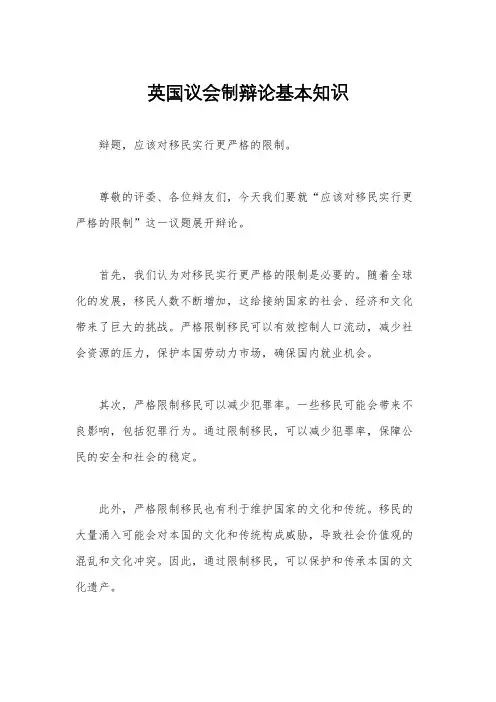
英国议会制辩论基本知识
辩题,应该对移民实行更严格的限制。
尊敬的评委、各位辩友们,今天我们要就“应该对移民实行更严格的限制”这一议题展开辩论。
首先,我们认为对移民实行更严格的限制是必要的。
随着全球化的发展,移民人数不断增加,这给接纳国家的社会、经济和文化带来了巨大的挑战。
严格限制移民可以有效控制人口流动,减少社会资源的压力,保护本国劳动力市场,确保国内就业机会。
其次,严格限制移民可以减少犯罪率。
一些移民可能会带来不良影响,包括犯罪行为。
通过限制移民,可以减少犯罪率,保障公民的安全和社会的稳定。
此外,严格限制移民也有利于维护国家的文化和传统。
移民的大量涌入可能会对本国的文化和传统构成威胁,导致社会价值观的混乱和文化冲突。
因此,通过限制移民,可以保护和传承本国的文化遗产。
然而,我们也要看到限制移民可能会带来的负面影响。
一些移民可能是为了逃避战争、迫害和贫困而来到接纳国家,对他们实行严格限制可能会剥夺他们的生存权利。
此外,一些移民也可能为接纳国家的经济和社会发展做出贡献,过于严格的限制可能会影响国家的发展和创新能力。
综上所述,我们认为对移民实行更严格的限制是必要的,但也需要考虑到对移民的人道主义关怀和对国家发展的积极影响。
希望各位评委和辩友们在辩论中能够充分思考,就这一议题做出理性和客观的判断。
谢谢!。

(完整版)英语辩论赛常用词汇和表达法汇总英语辩论赛常用词汇和表达法汇总辩论赛English debating Competition辩论赛事debating event主办host\manage议会制辩论形式preliamentary debating style循环赛preliminary debate淘汰赛elimination debate八分之一决赛octofinals四分之一决赛quarterfinals半决赛semifinals决赛grand final正方pro side反方con side正方一辩the first debater of pro side反方一辩the second debater of con side计时员timekeeper评委打分score the competition定义要合理the definition should be reasonable素材要有说服力matter should be persuasive没有平局there is no draws in competitive commpetition一辩:first debater二辩:second debater对方辩友,my fellow debaters开始的陈词,Honorable judges, distinguished guests, ladies and gentlemen.....如果想要驳斥对方的逻辑,进行假设:according to your logicYou are missing the point!(你没有说重点!你没有围绕中心!即,他在钻洞子,这个时候他很有可能会说漏。
注意,要用are,不能说成You're,因为这样语气,士气就没有了。
)You just don't understand what we talked about!(你根本就没有明白我们刚说了什么!即:误解了,曲解了)You know what? You are straying from the main point!你知道吗?你已经跑题了!(也要注意,都用You are)自由辩论的阶段,可以在他在说的时候,插进去,说“Wait!Wait!You just said……,did you?”(当然这句话要用在,你发现对方说的不正确时~~)You are generalizing what I asked!(你在以偏盖全!即:我要你回答这个,但对方你绕过去了!)Please ask my question!(请不要回避我的问题!请你回答!!)英语辩论赛常用语A征求他人观点或意见的用语I would be glad to hear your opinion of …我很乐意听听你对……的意见。

英语辩论赛常用词汇和表达法汇总辩论赛EnglishdebatingCompetition***英语辩论赛常用词汇和表达法汇总辩论赛 English debating Competition辩论赛事debating event决赛正方反方grand final打分 score the competition 定义要合理the definitionshould be reasonable正方一辩循环赛the first debater素材要有说服力 of pro side反方一辩 the second debater of con side四分之一决赛半决赛quarterfinals计时员timekeepersemifinals二辩: second debater对方辩友, my fellow debaters开始的陈词, Honorable judges, distinguished guests, ladies and gentlemen..... 如果想要驳斥对方的逻辑,进行假:设according to your logic You are missing the point !(你没有说重点!你没有围绕中心!即,他在钻洞子,这个时候他很有可能会说漏。
注意,要用 are,不能说成You're,因为这样语气,士气就没有了。
)You just don't understand what we talked about !(你根本就没有明白我们刚说了什么!即:误解了,曲解了)You know what? You are straying from the main point !你知道吗?你已经跑题了!(也要注意,都用 You are)自由辩论的阶段,可以在他在说的时候,插进去,说“Wait!Wait!You justsaid? ? , did you?”(当然这句话要用在,你发现对方说的不正确时了! )Please ask my question!(请不要回避我的问题!请你回答!!)正方affirmative 反方 negative 辩题 topic /issue校园辩论赛 academic debate 辩手/辩护advocate 歧义 ambiguity主事者 agent of change(负责采取正方计划的人或单位 )论点,论据argument 辩论 argumentation (正式 )辩论 debate 断言 assertion 佐证backing\裁判式评判人员\评审式评判人员主张claim 交锋clash 资料data,也作 ground 推定 presumption 论据evidence 目标goals 通案反驳 off-case 命题 proposition Refutation 反驳Stock issues 核心议题 Topicality 合题性Warrant~~)You are generalizing what I asked !(你在以偏盖全!即:我要你回答这个,但对方你绕过去matter debating styleshould be persuasive 没有平局there is no drawspreliminary debateoctofinalsin competitive competition 一辩: first debater主办host\\manage制辩论 preliamentary 会议pro side con side淘汰赛 elimination debate 八分之一决赛*****正方 Government一辩 Prime Minister 二辩 Member of the Government 一辩总结Leader of Opposition Rebuttal 1. 辩驳rebut 反驳...rebutment 辩驳...rebuttable 可辩解的 2. 攻辩攻辩 rebutment...自由辩论free debate 反方 Opposition一辩 Leader of the Opposition 二辩 Member of the Opposition 一辩总结Prime Minister RebuttalA clear gesture or hand signal rejecting the offer 用清晰的手势拒绝对方 A verbal rejection of the offer 语言拒绝A verbal acceptance of the offer 语言接受一. stating an opinion 陈述观点 a. in my opinion ? 我的意见是 ? ? b. personally I think ? ? 我个人认为 ? ? c. I believe that? ? 我相信? ? d. I think that ? ? 我觉得 ? ?e. the point is that? ?我的观点是 ? ? f. if you ask me ? ?如果你问我? ?g. I’d like to say this : ? ?我会这样说 ? ?h. I’d like to point out that 我想指出的是 ? ? i. speaking for myself 站在自己的立场上说? ? j. as far as I’m concerned, ? 就我而言,? ? k. in my experience ? 根据我的经验 ? ? 二. challenging an opinion 质疑某种观点 a. that can’t be true 那不可能是真的。
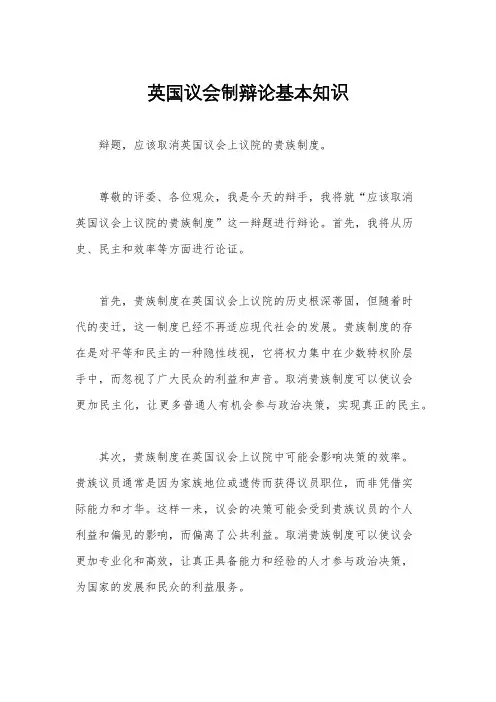
英国议会制辩论基本知识
辩题,应该取消英国议会上议院的贵族制度。
尊敬的评委、各位观众,我是今天的辩手,我将就“应该取消
英国议会上议院的贵族制度”这一辩题进行辩论。
首先,我将从历史、民主和效率等方面进行论证。
首先,贵族制度在英国议会上议院的历史根深蒂固,但随着时
代的变迁,这一制度已经不再适应现代社会的发展。
贵族制度的存
在是对平等和民主的一种隐性歧视,它将权力集中在少数特权阶层
手中,而忽视了广大民众的利益和声音。
取消贵族制度可以使议会
更加民主化,让更多普通人有机会参与政治决策,实现真正的民主。
其次,贵族制度在英国议会上议院中可能会影响决策的效率。
贵族议员通常是因为家族地位或遗传而获得议员职位,而非凭借实
际能力和才华。
这样一来,议会的决策可能会受到贵族议员的个人
利益和偏见的影响,而偏离了公共利益。
取消贵族制度可以使议会
更加专业化和高效,让真正具备能力和经验的人才参与政治决策,
为国家的发展和民众的利益服务。
综上所述,取消英国议会上议院的贵族制度是符合时代潮流和
民主发展的需要的,它有利于提高议会的民主化程度和决策的效率,为国家的长远发展和民众的利益谋福祉。
因此,我强烈主张取消英
国议会上议院的贵族制度。
谢谢!。
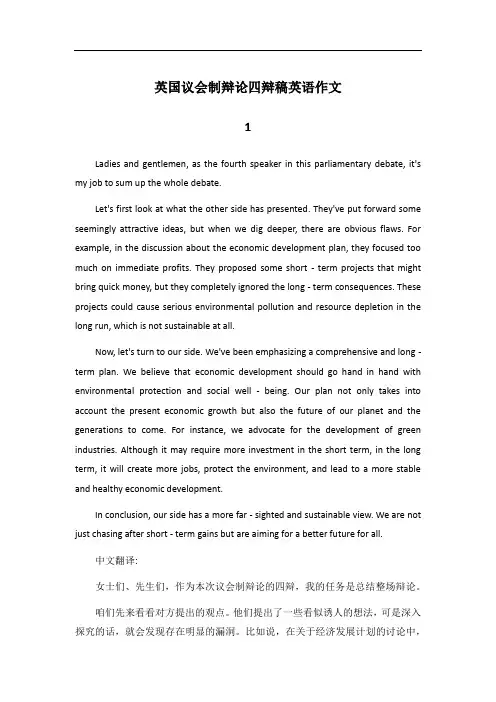
英国议会制辩论四辩稿英语作文1Ladies and gentlemen, as the fourth speaker in this parliamentary debate, it's my job to sum up the whole debate.Let's first look at what the other side has presented. They've put forward some seemingly attractive ideas, but when we dig deeper, there are obvious flaws. For example, in the discussion about the economic development plan, they focused too much on immediate profits. They proposed some short -term projects that might bring quick money, but they completely ignored the long - term consequences. These projects could cause serious environmental pollution and resource depletion in the long run, which is not sustainable at all.Now, let's turn to our side. We've been emphasizing a comprehensive and long -term plan. We believe that economic development should go hand in hand with environmental protection and social well -being. Our plan not only takes into account the present economic growth but also the future of our planet and the generations to come. For instance, we advocate for the development of green industries. Although it may require more investment in the short term, in the long term, it will create more jobs, protect the environment, and lead to a more stable and healthy economic development.In conclusion, our side has a more far - sighted and sustainable view. We are not just chasing after short - term gains but are aiming for a better future for all.中文翻译:女士们、先生们,作为本次议会制辩论的四辩,我的任务是总结整场辩论。
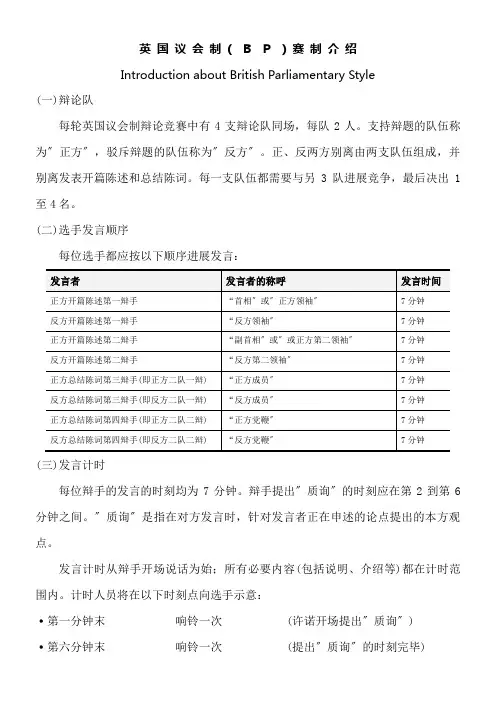
英国议会制( B P ) 赛制介绍Introduction about British Parliamentary Style(一)辩论队每轮英国议会制辩论竞赛中有4支辩论队同场,每队2人。
支持辩题的队伍称为〞正方〞,驳斥辩题的队伍称为〞反方〞。
正、反两方别离由两支队伍组成,并别离发表开篇陈述和总结陈词。
每一支队伍都需要与另3队进展竞争,最后决出1至4名。
(二)选手发言顺序每位选手都应按以下顺序进展发言:(三)发言计时每位辩手的发言的时刻均为7分钟。
辩手提出〞质询〞的时刻应在第2到第6分钟之间。
〞质询〞是指在对方发言时,针对发言者正在申述的论点提出的本方观点。
发言计时从辩手开场说话为始;所有必要内容(包括说明、介绍等)都在计时范围内。
计时人员将在以下时刻点向选手示意:·第一分钟末响铃一次 (许诺开场提出〞质询〞)·第六分钟末响铃一次 (提出〞质询〞的时刻完毕)·第七分钟末(7’00’’) 持续响铃两次 (发言时刻完毕)·超时15’后(7’15’’) 持续响铃 (发言缓冲时刻完毕)在持续两次响铃完毕后辩手有15秒“缓冲〞时刻,在这段时刻内许诺选手总结已出具论点。
“缓冲〞时刻内不许诺出具新论据,在“缓冲〞时刻内提出的新论据能够被裁判判为无效。
在〞缓冲〞时刻后仍继续发言的辩手将被裁判团扣分。
(四)辩手角色分派每一个选手都有一个定位,每一个发言都有其特殊目的。
下面列出的辩手角色描述具有借鉴作用,并非必需完全遵循。
依照不同的辩论形式,辩手有时需要在完本钱角色需要说明的部份之外,还要表述其它方面的观点,在正方支持辩题、反方驳斥辩题的根底上,发言构造仍需知足其它论证的需要。
除辩论两边的第四辩手,其它所有辩手都需要提出自己的论点。
除〞首相〞,所有辩手都要反对对方辩友的辩论。
辩手应该总结反方的延展案例并且对整场辩论中每支辩论队的立场做出回应。
反“反方总结〞方总结不能提出新的立论点。
正方一辩(PM)一.注意事项:1.status quo(辩题背景分析);2. Definition, narrowing down the topic(具体化)“for the purposes of ..., we will interpret the motion to include only...”;3. 为辩题设立并阐述一个讨论模型——若是政策性的,需要包括以下三项:stakeholder(s), feasibility, 其他有关细节。
4.为辩题立论(正方观点陈述arguments)二. 套句:Good morning/afternoon, ladies and gentlemen, dear judicators and Mr./Miss speaker. This house believes that ....As the prime minister, I want to give a definition, my definition is that.... Before I come to my arguments, I will give you several status quo.The first status quo is that/about...The second status quo is ...Now, let’s move to my arguments.My first argument is...My second argument is about ...My third argument is..还剩时间的话:ladies and gentlemen, what I have told you is that...The second for... the third for...Base on these three(视情况而定) arguments, we are so proud to propose today's motion. Thank you.反方一辩(LO)一、注意:承接正方观点(engage),反驳后陈述己方观点。
英语辩论赛常用词汇和表达法汇总辩论赛English debating Competition辩论赛事debating event主办host\manage议会制辩论形式preliamentary debating style循环赛preliminary debate淘汰赛elimination debate八分之一决赛octofinals四分之一决赛quarterfinals半决赛semifinals决赛grand final正方pro side反方con side正方一辩the first debater of pro side反方一辩the second debater of con side计时员timekeeper评委打分score the competition定义要合理the definition should be reasonable素材要有说服力matter should be persuasive没有平局there is no draws in competitive commpetition一辩:first debater二辩:second debater对方辩友,my fellow debaters开始的陈词,Honorable judges, distinguished guests, ladies and gentlemen.....如果想要驳斥对方的逻辑,进行假设:according to your logicYou are missing the point!(你没有说重点!你没有围绕中心!即,他在钻洞子,这个时候他很有可能会说漏。
注意,要用are,不能说成You're,因为这样语气,士气就没有了。
)You just don't understand what we talked about!(你根本就没有明白我们刚说了什么!即:误解了,曲解了)You know what? You are straying from the main point!你知道吗?你已经跑题了!(也要注意,都用You are)自由辩论的阶段,可以在他在说的时候,插进去,说“Wait!Wait!You just said……,did you?”(当然这句话要用在,你发现对方说的不正确时~~)You are generalizing what I asked!(你在以偏盖全!即:我要你回答这个,但对方你绕过去了!)Please ask my question!(请不要回避我的问题!请你回答!!)英语辩论赛常用语A征求他人观点或意见的用语I would be glad to hear your opinion of …我很乐意听听你对……的意见。
常见的BP制是四队议会制辩论,每场比赛分正反双方,设“正方上院”、“正方下院”、“反方上院”、“反方下院”四队,每队两人。
正方上院第一位发言者(首相Prime Minister、正方一辩)职责:1.合理诠释辩题,下定义;2.给出支持该论点的论证体系。
论证体系是指第一正方论点的一个或者数个论据3.使用任何首相认为重要的策略评判的最大因素:1.定义优先权:有权对辩题中没有明确的背景、主体、对象等定义要素加以明确,除非该定义明显有悖公众一般认知或故意破坏辩论进行下去的可能性且未说明如此定义的必要性,否则对方不能拒绝该定义2.论点框架责任:必须给出正方上院的论点框架,即使自己无法完全展开,但必须概括介绍反对党领袖Leader of the Opposition(反方上院第一位发言者、反方一辩)职责:1.直接或间接反驳正方部分或全部论证体系2.至少给出一个理由,阐明反方为何反对首相诠释的辩题3.使用任何反对党领袖认为重要的策略必要时,反对党领袖可以质疑正方给出的辩题定义,如正方给出定义完全不合理或严重影响辩论质量。
质疑定义只能正方在极端曲解辩题时使用评判的最大因素:1.定义接受责任:检查定义是否明显有悖公众一般认知或故意破坏辩论进行下去的可能性且未说明如此定义的必要性,如无,则宣布接受该定义。
一旦决定不接受,则比赛即进入“挑战定义”的特殊状态。
事实上99%的情况下不会“挑战定义”。
2.论点框架责任:必须给出反方上院的论点框架,即使自己无法完全展开,但必须概括介绍副首相 Deputy Prime Minister (正方上院第二位发言者、正方二辩)职责:1.攻击反对党领袖对正方提出的反驳,并重新建立起正方论据2.反驳反方提出的部分或所有论据3.深入阐释正方辩论体系4.使用任何副首相认为重要的其他策略评判的最大因素:论点展开责任:在首相的框架展开论点反对党副领袖 Deputy Leader of the Opposition (反方上院第二位发言者、反方二辩)职责:1.继续反驳正方论据2.重申反对党领袖反对辩题的论据3.继续阐释反对一方反对辩题的理由4.使用任何反对党副领袖认为重要的其他策略评判的最大因素:论点展开责任:在反对党领袖的框架展开论点政府阁员 Member of Government (正方下院第一位发言者、正方三辩)职责:正方二辩的基本职责是支持正方一队的观点,同时提出己方新的论据支持辩题。
英国议会制(British Parliamentary Style)(1)采取4队制英国议会制辩论形式,即正反方各两队。
(2)Parliamentary Points of Information (abbreviated to POI ) 提问Debaters may request a point of information (either verbally or by rising) at any time after the first minute, and before the last minute, of any speech.The debater holding the floor may accept or refuse points of information. If accepted, the debater making the request has fifteen seconds to make a statement or ask a question. During the point of information, the speaking time of the floor debater continues. The debater should take at least one point of information.No other parliamentary points such as points of order or points of personal privilege are allowed.(3)Speaker Roles and Speech Specific Purposes 辩手角色及责任Each speaker has a role and each speech has a specific purpose. The descriptions of speaker roles and speech purposes listed below are suggestive and are not intended to be exhaustive or exclusive. For reasons that vary from debate to debate, speakers may sometimes need to fulfill roles not mentioned here and speeches may be constructed to serve other purposes as long as proposition speakers affirm the proposition and opposition speakers oppose it.All speakers, except the final speakers for the proposition and opposition (government and opposition whips), should introduce new material. All debaters should make rebuttal, except the opening speaker (prime minister).Summary of Debate FormatSummary of Speaker Roles and Responsibilities(4) 辩论队与辩题(The T eams and Motions)The team supporting the motion in Four-Team Parliamentary Debate is referred to as the “proposition.” The team arguing against the motion is known as the “opposition” team.Ordinarily motions are announced shortly before each debate begins. A different motion will be used for each debate, and will be presented to the debaters at a specified time, usually 25 to 30 minutes prior to the round.The motion will be announced to all debaters simultaneously. Preparation time will be fifteen to thirty minutes. During this time the debaters may consult any written materials. The only materials allowed for use by the debaters during the actual debate are those notes the debaters themselves have written during the preparation time.附件2:评委及评分细则Judges must agree to follow these rules and are not allowed to impose any other rules.Following the debate, the judges confer with one another and come to an agreement on how the teams should be ranked and scored. The teams will be ranked based on the manner and matter of presentations in the debate, including team and speaker role, argumentation, and persuasion.V erbal adjudication ordinarily is made for each debate by the judge designated as “chair” or by a judge appointed by the chair. V erbal adjudication should explain the winner of the debate and provide any additional advice for teams. Then adjudication should not last more than 5 minutes.Judges should assign speaker points for each speaker based on the manner and matter presented during the speech on a 50-point scale and both speakers‟ scores add up to the team‟sfinal score. The details go as follows:A.Matter (25 points) 素材[1] Matter relates to the issues in debate, the case being presented and the material used tosubstantiate argumentation and the material used to substantiate argumentation. (5 points) [2] The issues under debate should be correctly prioritized (by teams) and ordered (by individuals), dealing with the most important/pertinent first.素材应该按照由主到次的顺序提出,将最切题、最重要的素材放在前面。
英国议会制辩论基本知识
辩题,是否应该实行选举改革,改变英国议会制度?
尊敬的主持人,各位评委和各位听众:
我代表支持选举改革的一方,我们认为英国议会制度需要进行
改革,以更好地代表人民的利益。
首先,我们认为目前的第一过去
制度导致了选票的浪费,因为许多选票投给了未能当选的候选人。
这种情况导致了民意的分散,使得议会中的政党代表并不真正反映
了人民的意愿。
因此,我们主张采用另一种选举制度,比如单记名
投票,以确保每个选票都能产生实质性的影响。
其次,我们认为议会制度应该更加多元化,以反映不同社会群
体的声音。
目前的议会中,女性、少数族裔和其他边缘群体的代表
比例仍然偏低,这导致了一些重要议题无法得到充分的讨论和决策。
因此,我们主张采取措施,比如设立特定的选区来保证这些群体的
代表人数,并且鼓励更多的人参与政治活动。
最后,我们认为议会制度应该更加透明和负责。
目前的议会决
策过程相对封闭,很多决策都是在幕后进行的,这导致了公众对政
府的不信任。
因此,我们主张采取一系列措施,比如公开议会会议、加强政府信息公开制度等,以确保政府的决策更加透明和公正。
总之,我们认为英国议会制度需要进行改革,以更好地代表人
民的利益,实现民主的理想。
我们希望能得到各位的支持,一起推
动议会制度的改革,让英国成为一个更加公正和民主的国家。
谢谢!。
Team:4 Teams (two Government and two Opposition).Each team has two speakersGovernment Bench:- Opening Government (Prime Minister & Deputy Prime Minister)- Closing Government (Member of Government & Government Whip) Opposition Bench:- Opening Opposition (Leader of Opposition & Deputy Leader of Opposition)- Closing Opposition (Member of Opposition & Opposition Whip)The two teams on the Government Bench will support the motion, and the two teams on the Opposition Bench must oppose the motion. However, while the two teams on each bench are on the same side, they have to have different reasons for supporting/opposing the motion. So for example, for the Closing Government to come 1st in the debate,they must show two things:(1) that the motion should stand, and (2) that the new perspective (extension) and new reasons they gave for the motion to stand are more important or more convincing than the reasons given by the Opening Government.Why are there 4 teams in a BP debate?Often in the British Parliament, government is formed by a coalition (联合)of two parties. Here’s an example of how it works: imagine if after an election, the Labour Party and the Green Party form a coalition government. Even though they are “on the same side”, they are still competing ag ainst each other for voter support. That means that when an issue is debated, they will to take the same position, but for different reasons. So if the issue of nuclear power is debated, for example, the Green Party will oppose the policy for environmental reasons, whereas the Labour Party might oppose it because it means coal workers will lose their jobs. So they both oppose nuclear power – they have the same stance – they take the stance for different reasons.Speaking order:1st opening government (Prime Minister)1st opening opposition (Leader of Opposition)2nd opening government (Deputy Prime Minister)2nd opening opposition (Deputy Leader of Opposition)1st closing government (Member of Government)1st closing opposition (Member of Opposition)2nd closing government (Government Whip)2nd closing opposition (Opposition Whip)POI:(1)Points of information are impromptu(即席的)questions raised by opposing teams.(2)They may be delivered any time between the 1 minute and 6 minute bells. POIs may only be given to speakers on the other Bench. So if you are on the Opening Opposition, you can only ask POIs to the Opening Government and Closing Government but not to the Closing Opposition. (3)POI’s should not be more than 15 seconds. (4)The chairman may request a speaker to end a POI at his/her discretion.(5)If asked well, a 15 second POI can have a huge impact on the debate. (6)Y ou should address the chair of the debate as Mr. Speaker or Madame Speaker. (7)Y ou can offer as many POIs as you like to each speaker, but if you stand up too often (or just after the speaker rejected a POI) then it can become annoying. Wait until the speaker finishes that point or moves on to another point, before offering another POI.(8)If you accept only one POI –or even no POIs –it looks like you are scared of what the other team has to say. However if you accept more than two, it might look like you have nothing to say yourself and are trying to fill in time!Two is just right.(9)One must respond to a POI once it is accepted. Y ou cannot just ignore it and carry on. If it really is in the material later in your speech, you can state that you will address it in then, but you must come back to it. It is better if you simply address the question briefly immediately.(10)What kind of POI can I ask? Pointing out a fact that disproves her/his pointShowing how her/his reasoning is flawed瑕疵Showing that the point or example that the speaker is making is not relevant Remind the adjudicators评委of a point you made earlier in the debate that is relevant (this is particularly useful if you are an opening team and the closing teams are now speaking)Introduce something that your team will say later in the debate –called “flagging”(if you are a closing team and the opening teams are speaking. Be careful doing this though –clever opening teams will hear this and will steal your arguments!)(11)The key to a good POI is that it is short and sharp. A good POI should be only 2 or 3 sentences long.(12)Confer with your partner (in a quiet whisper), as s/he may have a better POI to ask than youUpper House --- Lower HouseGovernment:Supporting Motion2 upper Government Speakers2 lower Government SpeakersOpposition:Arguing against Motion2 upper opposition Speakers2 lower opposition SpeakersUpper House(Opening)Prime Minister, 1st Government TeamLeader of the Opposition, 1st Opposition TeamDeputy Prime Minister, 1st Government TeamDeputy Leader of the Opposition, 1st Opposition TeamLower House (Closing)Member of Government, 2nd Government TeamMember of Opposition, 2nd Opposition TeamGovernment Whip, 2nd Government TeamOpposition Whip, 2nd Opposition TeamResponsibility:Opening Government (OG)This team’s job is to set up the debate. If the debate sucks, after the debate everyone will blame OG!! Setting up isn’t too hard though: it just means you need to properly define the topic –tell us what the debate is all about –and provide a positive case.- 1st Speaker (Prime Minister): Defines the topic, states what the split willbe between the 1st and 2nd speakers, and then produces arguments and reasons for supporting the motion.The definition should state the issue (or issues) for debate arising out of the motion and state the meaning of any terms in the motion that require interpretation. The Prime Minister should provide the definition at the beginning of his or her speech.The definition should be fair –it should set up the debate, not win it.A definition is not allowed to be:(1)time set, where a debate is set in the past or the future(2)Moral truism自明之理, something to which no real opposition exists (like “Genocide种族灭绝is bad”.)(3)self-proving, when the case is that something should or should not be done and there is no reasonable rebuttal(4)when a motion has an obvious meaning, you can not twist the wording of the motion to debate onto something else.How can the Opening Government set up the debate?Broadly, there are two kinds of motions: those that create policy debates, and those that create principle debates.A policy debate requires the teams to provide a solution to a problem –that means they have to convince us that we should actually do something. In debating, this solution is called a model.An example of a debate where model is needed would be: “This House Believes That We Should Ban Smoking In Public Places”.To set up this debate, the Opening Government team would have to do a few things:(1) tell us what public places are (i.e. the definition) and outline the specifics of such a ban (“we would ban the production, sale, and consumption of tobacco in all forms),(2) tell us exactly how smoking should be banned (the model could be fines, or perhaps jail?); (violators would be subject to criminal and civil sanctions commensurate with the severity of the violation, ranging from simple fines for possession to incarceration for repeated attempts to produce and distribute”); (in some cases, agent, financing, other terms)(3) tell us why smoking should be banned;(4) tell us why the ban should be the kind of ban that they propose (so if the ban they propose would see public smokers are jailed, the Opening Government must explain why this is so).Here’s an easy 4-step guide to setting up a policy debate:Gov Case (4 steps)There is a problem, which is…The cause of the problem is…Our solution (model) is…And it will work because…Should I challenge the proposition’s definition?Only the first speaker of the opposition allowed in theory.But don’t do it because debates about the definition is bad and horrible to watch.It is legitimate合法的,正常的to define where no definitions has been offered.- 2nd Speaker (Deputy Prime Minister): Rebuts the Opposition Leader, produces more positive reasons. Except for POIs, this the last time OG will get to speak in the debate, so the Deputy Prime Minister will normally provide a quick summary of OG’s case.Responsibility:Opening Opposition (OO)OO main just is to respond to OG. They also need to produce their own case. - 1st Speaker (Leader of Opposition): Rebuts the PM, provides the split and produces OO’s arguments.- 2nd Speaker (Deputy Leader of Opposition): Rebuts the Deputy Prime Minister case and produces positive matter, briefly sums up OO’s case. Responsibility:Closing Government (CG)CG rebuts OO and produces a case extension (see section 6: Extensions).- 1st Speaker (Member of Government): Rebuts OO and then outlines their team’s case extension. Then produces positive matter/arguments.- 2nd Speaker (Government Whip):Rebuts OO and CO with particular reference to their team’s case extension. Sum up the case of the Government bench and the debate. The speaker should avoid introducing new matter. Responsibility:Closing Opposition (CO)CO rebuts OO and CG and produces a case extension.- 1st Speaker (Member of Opposition): Rebuts the Government bench and then outlines their team’s case extension. Then produces positive matter/arguments.- 2nd Speaker (Opposition Whip): Rebuts the Government bench with particular reference to their team’s case extension. Sum up the case of the Opposition bench and the debate. Under no circumstances can this speaker of the team introduce new matter.Extension:(1)The role of the Closing Government and Closing Opposition teams in the debate is to provide an “extension”. (2)This means that they must introduce something new into the debate. (3)Don’t forget, your extension has to be consistent with your opening team’s position and arguments! Y ou can’t contradict 反驳their points.(4)The only rules to remember about case extensions is that:(a) Y our case must be clear.(b) It must be different from the 1st team’s case.(c) It must not contradict the 1st team’s case.(5)Extensions can be:a different perspective on the issue&a more in-depth analysis on the opening team’s caseExample 1: “This House Would Not Allow Nuclear Power.”The Opening Government -- nuclear power is dangerous, and that used nuclear material is bad for humans and the environment. This is the environmental concern.The Closing Opposition’s extension -- nuclear power should be opposed because the technology can be easily misused to make nuclear weapons. This extension is the security perspective.So in this example, the Closing Government’s position is consistent withOpening Government –they both oppose nuclear power –but they haveprovided a fresh set of reasons for supporting the OG’s policy.Example 2: This house would abolish the death penalty.OG -- the death penalty is inhumane, and that it is always wrong to take life ; the death penalty does not deter crime.CG -- use of the death penalty in the USA, showing that use of the death penalty there has targeted racial minorities and people from poorer socio-economic background (the race and socio-economic argument).-- highlight some examples in the USA where innocent people wereexecuted, and they quote the maxim that: “It is better that one hundredguilty men go free than that one innocent man is executed”(the possible miscarriage of justice argument).-- show how the predictions made by OG were proved to be true in the USA, by pointing out that, since the introduction of the death penalty in the USA, crime rates had in fact gone upMG&MO:What Tasks to Undertake?Task 1. Refutation-- Be brief (maybe 2 minutes)-- Focus on the most important objectionsTask 2. Extension (new material)-- Should be a major portion of your time-- Should contain much analysisTypes of Extension:(1)New line of argument:A new reason to explain why your side’s centralclaim is correct. This new reason is independent from the other reasonsthat have been given.(2)Deeper analysis of existing argument:More comprehensiveunderstanding of the arguments already discussed.Like onion-peeling,figure out the reason behind each arguments made.Maybe explain the theory behind these arguments.Maybe explain exactly how a vague theory directlyapplies to this situation(3)focused case study:Focus on one typical example and offer detailedanalysis of it.Explain why this typical example is similar (and so is a good guide to what will happen in the situation being debated).Example: The USA tried prohibiting alcohol in the 1930s, and it was a big failure.Looking at the details of banning alcohol shows us why banning smokingwill fail.Criteria of a good extension:New argument / analysisLoyalty (to previous team on your side)Advances the debate (clarifies issues)Whip speeches:(1)GW speech: Give direct refutation of MO extension&Give crystallization具体化:-- Direct comparison of GOV & OPP positions (2)OW speech:Give crystallization:-- Direct comparison;-- Should include indirect refutation to the whole GOV positionOW Should Not Refute GW Directly:(1)A Whip speech should be a reframing job, to highlight advantageous arguments.An experienced whip will reframe the debate by focusing on familiar andfavorable territory.(2)If OW makes direct refutation point by point towards GW, he falls intothe trap of just fighting on their terms.OW refutation of GW should be indirect.Criteria(标准)of a good whip speech:(1)Summarize in an honest & seemingly unbiased manner(2)Summarize in a way that supports your side of the motion(3)Summarize in a way that emphasizes your team’s extensionmaterialStrategy of Whip Speech1) Select the most important issues2) Select the issues at your advantage3) Avoid repeating opponents’remarks4) Analyze from a higher level/perspectiveWhip perspective is like judges’perspectiveMatter&manner:Matter :(1)content of the speech(2)arguments a debater uses to further his/her case and persuade the audience(3)includes arguments and reasoning, examples, case studies, facts and other material that attempts to further the case(4)includes positive material, rebuttals, points of information offered and points of information taken(5)matter should be relevant, logical and consistentManner:(1)presentation of the speech(2)style and structure a debater uses to further his/her case and persuade the audience.style:elements of style include eye contact, voice modulation, hand gestures, language, the use of notes and any other element which may affect the effectiveness of the presentation of the member.structure:Structure includes structure of the speech of the member and the structure of the speeches of the team (1)Individual structure:- elements of structure include the structure of the speech of the member and the structure of the speech of the team- each debater’s speech should include: an introduction, series of arguments and a conclusion- it should also be well-timed in accordance with the time limitations and the need to prioritise and apportion time to matter(2)Team structure:- both members should adopt a consistent approach- positive matter should be allocated to both members of the teamFinding Fundamental Questions:What is the purpose of …?…(government, education, punishment, etc.)What is the best way to …?What is the difference between …?Four-Step Refutation 驳斥Process:1. “They say…”(identify the target argument you will be refuting)2. “But I say…”(state the claim of your own refutation)3. “Because…”(provide support for your refutation)4. “Therefore…”(explain why the argument is important to the debate)Accepting&refusing POI:(1)To refuse a POI, the debater may say something like “No thank you”or “not at this time”or may simply use a hand gesture to indivate the person should take return to their seat(2)To accept a POI, simply say something like, “your point please”(3)Debaters should accept at least 1 and no more than 3 points during their speech(4)Don’t allow the opponent to follow up with additional questionsElements of Arguments:(1)Claim: the main point or conclusion of an argument.Evidence: any information on which the claim rests. Evidence is information that supports the claim.(2)Link: a link is a statement that creates a bridge between the evidence and the claim.(3)Reservation: not present in all arguments, a reservation explains special circumstances when the claim should be set aside.。
1 / 5
Honorable judges, distinguished guests, ladies and gentlemen.....
LOGICAL & CLEARLY
Ways to open a debate
To set the framework for our opinion, we believe it is necessary to state…
We would like to introduce our stand by giving the following definitions. …
In order to effectively debate this topic, we would like to propose….
A number of key issues arise which merit (deserve) closer examination.
In the first place we would like to make clear that….
The main argument focuses on….
1.Giving Reasons and offering explanations:
To start with…,
The reason why...,
That's why...,
For this reason...,
That's the reason why...,
Many people think....,
Considering...,
Allowing for the fact that...,
When you consider that...,
2. Asking for an opinion from the other party
I would be glad to hear your opinion of … 我很乐意听听你对……的意见。
I was wondering where you stood on the question of … 我想知道你对……问题怎么看。
2 / 5
well…what do you think (about
What's your view on the matter 就这件事你的看法呢
how do you see it你怎么看它
do you think that…你认为…吗
3.Stating an opinion陈述观点
I think..., In my opinion..., I believe…
I'd like to point out that我想指出的是…
Speaking for myself站在自己的立场上说…
I'd like to say this… 我会这样说…
I suppose...,
The way we see it...,
As far as I'm concerned..., 就我而言,…
If it were up to me...,
I suspect that...,
I'm pretty sure that...,
It is fairly certain that...,
I'm convinced that...,
I honestly feel that…,
While others may argue that…, Considering the current …,
A recent study has shown that…,
4.How to convince in a debate
The other team has tried to make some good points, however, they forgot to think about some
very important issues, namely….
3 / 5
We hear what the opposition are saying but we do not agree. We will prove to you…
That’s one way to think about it, however,….
At first sight, their argument seems to be true. But….
They unfortunately failed to reveal the truth of the matter,….
It is easy enough to make broad generalisation about...like the other team just did, but in reality it
is a very complex issue.
It is only a matter of time until it will become evident that the other teams
stand must fall due to the following reasons….
We must take into account that….(我们必须考虑到...)
5.Clarifying a point阐述观点
a. what I said was…我刚才说的是…
b. what I mean to say was…我的意思是说…
c. let me repeat what I said.让我重复我刚才所说的。
6.Concluding the points of the other side debater
As you said… 像你所说的那样……
But havent you said that…?但是,难道你没说过……吗?、
If I understood you correctly, you said that… 要是我理解正确的话,你说过…….
12.Thats a good point.这个看法不错
I feel the same way.我也持同样的想法。
4 / 5
10. I'm inclined to disagree with that.
Don't you think it would be better..., I'd prefer...
But what about...,但关于…方面呢
That cant be true那不可能是真的。
I'm afraid I don't agree...
Frankly, I doubt if...,
The point you have made is interesting but negated by the fact that...
While your statement is compelling, I believe you have not expressed the main point of the
problem.
I understand your viewpoint, but it fails to consider...
11. Possible conclusions
To conclude, we must emphasise our opinion of…., (....)therefore the other teams
point of view can no longer be supported.
我想我们有相同点和不同点。
Pay attention!
Avoid using absolute statements like Always, All, or Never .
Its recommended to use these words instead
Almost all…,
Usually…,
Most of the time…,
Frequently…,
5 / 5
Rarely…,
On occasion…,
Refrain from saying you are wrong.
正方
Prime minister ,deputy Prime minister (Opening government)
Member of the government, government whip. (closing government)
反方
Leader opposition , Deputy Leader opposition (Opening opposition)
Member of the opposition , opposition whip (Closing opposition)
1.“Im sorry you just have missed a point that…”
2.STRESS“far away from the topic we are talking about”。
3.在前几个环节中,四辩一定要把对方辩手的遗漏之处尽量记下来,在总结的开始就提出
他们的漏洞,这也是想要胜辩的关键!
clearly